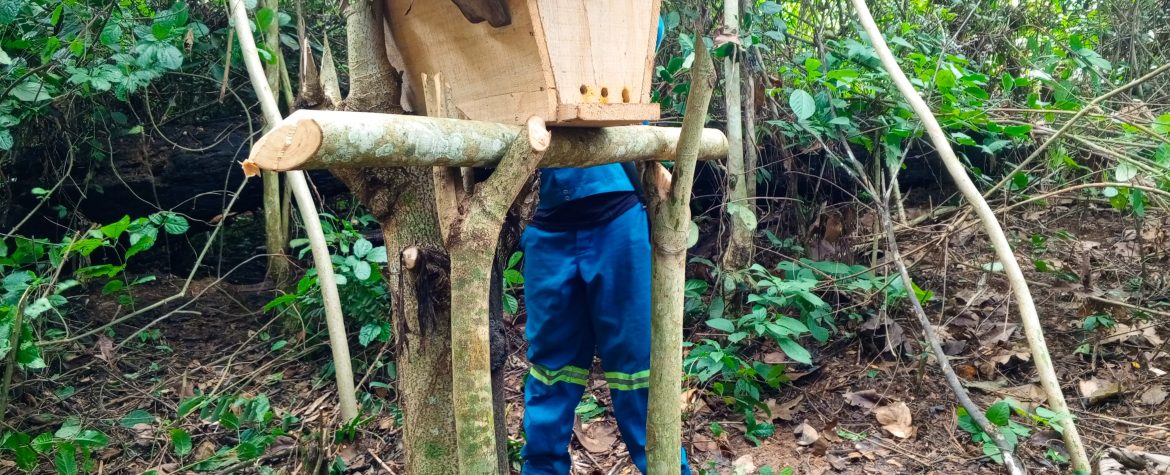BEE FARMING
- Home
- BEE FARMING
- aces
- April 25, 2024
- 0 Comments
BEE FARMING: An Initiative to Promote Community Resilience, Increase Household Income While Enhancing the Conservation of Wildlife and Natural Habitat.
In recent years, the intersection of conservation efforts and community livelihoods has gained increased attention. The conservation of wildlife and natural habitats must go hand in hand with supporting the livelihoods of local communities. One innovative approach that has gained traction is bee farming, which not only provides an alternative income source but also contributes to mitigating human-wildlife conflicts and preventing bushfires. In this article, we delve into the transformative impact of a bee farming initiative implemented by the Association for Conservation and Environmental Sustainability (ACES) funded by the Rufford Foundation.
In a bid to address the multifaceted challenges faced by local communities, ACES embarked on a project to train five communities around the Deng Deng National Park in bee farming techniques. The project aimed to equip individuals with the knowledge and skills needed to engage in sustainable beekeeping practices while simultaneously promoting conservation efforts. This initiative was not merely about beekeeping; it was about fostering resilience, preserving natural ecosystems, and empowering communities to thrive in harmony with their environment.
Through diligent efforts, ACES successfully trained at least 15 individuals from each community, imparting them with the intricacies of bee farming, hive management, and honey production. The training sessions served as a platform for knowledge exchange, empowering participants to become adept beekeepers and entrepreneurs within their communities. The newfound expertise instilled a sense of purpose and hope, igniting a spirit of determination to create a better future.
In a pivotal move to bolster the initiative, ACES generously donated 75 bee hives, 5 smokers and 5 bee suits to the communities, providing them with the essential resources needed to kickstart their beekeeping endeavors. The impact was profound, as the communities embraced the opportunity to not only enhance their income through honey production but also to contribute to conservation efforts by providing sustainable habitats for bees, thereby indirectly supporting the broader ecosystem.
The ripple effects of the bee farming initiative extended beyond economic empowerment and conservation. By engaging in beekeeping, communities inadvertently mitigated human-wildlife conflicts, as the presence of bee hives acts as a natural deterrent to certain wildlife species, thus reducing confrontations and crop damage. Furthermore, the strategic placement of bee hives played a pivotal role in preventing bushfires, as the increased presence of bees discouraged encroachments into critical habitats, thereby safeguarding against potential fire outbreaks. Central to the success of this endeavor was the support we received from the Rufford Foundation, whose steadfast commitment to supporting young conservationist-achieved projects
in conservation, environmental sustainability, and community empowerment catalyzed the realization of this impactful initiative. Their support exemplifies the profound impact that small efforts can yield in fostering positive change within communities and ecosystems. As we celebrate the achievements of the bee farming initiative, we are reminded of the profound impact that can be achieved when communities are empowered to become stewards of their environment, and when conservation efforts are intricately woven into the fabric of sustainable livelihood initiatives.
Looking to the future, the effects of this initiative are poised to resonate far and wide, serving as a beacon of inspiration for other communities and organizations seeking to forge a harmonious coexistence between human activities and the natural world. The lessons learned from this journey underscore the potential for innovative, community-driven solutions to confront the complex challenges of our time, offering a blueprint for sustainable development that respects and nurtures both people and the planet.
As we reflect on the journey of ACES’ bee farming initiative, we are reminded that the true essence of conservation lies in the empowerment of communities, the preservation of natural ecosystems, and the cultivation of resilience in the face of adversity. Through the simple yet profound act of bee farming, lives have been transformed, livelihoods have been uplifted, and the delicate balance between human activities and the environment has been harmonized.
In the words of a beekeeper from one of the communities, “The buzzing of bees has brought a new melody to our lives, a melody of hope, prosperity, and coexistence with nature. We are not just beekeepers; we are guardians of our land and the creatures that inhabit it. Together, we are sowing the seeds of a brighter future for generations to come.“
As we celebrate this milestone, let us continue to nurture and support initiatives that empower communities, preserve biodiversity, and herald a sustainable future for all.
The buzz of bees echoes the promise of a brighter tomorrow, a tomorrow where communities thrive, ecosystems flourish, and the tapestry of life is woven with threads of harmony and resilience.
As we stand at the crossroads of possibility, let us heed the gentle hum of nature’s ambassadors and embark on a collective journey towards a world where the sweet nectar of progress is savored by all.


Leave A Comment